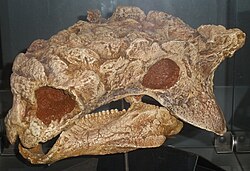Tarchia
|
Tarchia Temporal range: Late Cretaceous, 75–70 Ma |
|
|---|---|
 |
|
| A cast of specimen PIN 3142/250, the holotype of T. teresae | |
| Scientific classification | |
| Kingdom: | Animalia |
| Phylum: | Chordata |
| Class: | Reptilia |
| Clade: | Dinosauria |
| Order: | †Ornithischia |
| Family: | †Ankylosauridae |
| Subfamily: | †Ankylosaurinae |
| Genus: |
†Tarchia Maryanska, 1977 |
| Type species | |
|
†Tarchia kielanae Maryanska, 1977 |
|
| Other species | |
|
†Tarchia teresae |
|
| Synonyms | |
|
|
†Tarchia teresae
Penkalski & Tumanova, 2016
Tarchia (meaning "brainy one") is a genus of herbivorous ankylosaurid dinosaur from the late Cretaceous of Mongolia.
In 1970, a Polish-Mongolian expedition discovered an ankylosaurian skull near Khulsan.
In 1977, Teresa Maryańska named and described the type species Tarchia kielanae. The generic name is derived from Mongolian tarkhi, "brain" and Latin ~ia, in reference to a brain size presumed larger than that of the related form Saichania. The specific name honours Professor Zofia Kielan-Jaworowska, the leader of the expedition.
The holotype, ZPal MgD-I/111, was discovered in the Upper Cretaceous (possibly Campanian-Maastrichtian) Barun Goyot Formation (previously known as the 'Lower Nemegt Beds') of the Nemegt Basin of Mongolia. It consists of a skull roof, braincase and rear skull elements. Maryańska referred three additional specimens: ZPAL MgDI/43, a large postcranial skeleton containing three "free" tail vertebrae, twelve tail vertebrae of the "handle" of the tail club and a scute; ZPAL MgDI/49, a right humerus; and PIN 3142/251, a skeleton with skull, that as yet remains undescribed.
Tarchia is currently, with Saichania, among the geologically youngest known of all the Asian ankylosaurid dinosaurs.
...
Wikipedia
